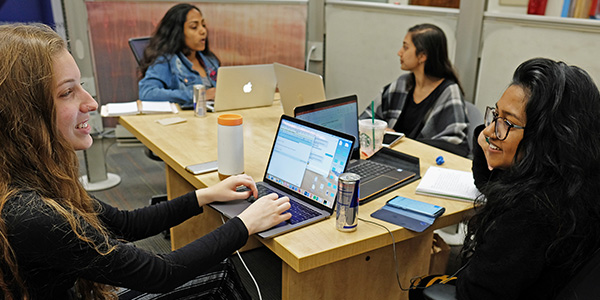Why Godwin-Jones chooses open: access and international collaboration

This interview series “Why We Choose Open: OER Stories” invites VCU community members to share why they use, adapt or create Open Educational Resources (OER) and what impact that work has on their students, teaching experiences, and/or career.

Robert Godwin-Jones,
School of World Studies
2017 Affordable Course Content Award Recipient
Project: Language and Culture in Context: A Primer on Intercultural Communication, an open textbook accompanied by an online tutorial with videos, self-assessments, and more for each chapter. Available digitally with PDF downloads, and through Libretext.
Estimated annual student savings: $13,000
Average number of VCU students impacted annually: 90
Briefly describe your project
The most widely used textbooks on intercultural communication in the United States are very similar. They are based on Anglo-American theories and practices of communication, characterize culture as identical with the values, beliefs and traditions of a country’s majority population, and discount the importance of language (and language learning) in developing intercultural competence. For this project, I wanted to develop an alternative approach: incorporate views and experiences from non-Anglo-American scholars and sources, integrate research findings from other disciplines, and develop a generally multicultural and multi-linguistic approach.
My strategy to move in those directions was to conduct more research in intercultural communication as taught beyond the United States, but especially to connect directly with colleagues from other cultures. I was fortunate to connect with colleagues from a variety of countries interested in the project and ultimately collaborated principally with professors from India and Taiwan, who contributed important non-Western perspectives to the text. I also worked closely with a colleague from VCU originally from Lebanon.
What motivated you to make the switch to open and affordable course content?
I wanted to have an open textbook for a variety of reasons: to lower the cost for many students, but also to enable it to be used by others, especially in educational settings where commercial textbook prices make their use problematic. That has allowed, for example, the text to be used in India, in a series of workshops I team-taught there with a colleague from the Indian Institute of Technology in Kharagpur. Having an open, digitally delivered text also makes it sustainable, as I am able to update the content easily, with instant availability of that revised text. That is an important factor in teaching intercultural communication, which ties closely to ongoing social and cultural developments across the globe. The text is available as an ebook, making it easily readable on mobile devices.
What was your experience creating OER material?
The experience of creating the textbook was time-consuming but rewarding. It was especially valuable to have input on my early drafts from a variety of colleagues from different cultures, but also representing different disciplinary approaches. That made the writing experience a profound learning experience for me.
How were students impacted by the new materials? What was their reaction?
Student reaction has been very positive. That has been particularly the case since students in my sections of the course in which it is used at VCU (WRLD 302, Communicating across cultures) began regular virtual exchange sessions with students abroad, initially with the Indian Institute of Technology in Kharagpur, and, more recently, with Wenzao University in Taiwan.
In both cases, the students abroad used my open textbook, which facilitated the process of creating topics for discussions online, as students from both universities could assume the same basic background knowledge. On both sides online questionnaires were administered in 2019 regarding the textbook and the virtual exchanges. The satisfaction rate as registered by Wenzao students was 83 percent; for VCU students it was 76 percent. A full report was published recently in Intercultural Communication Studies.
How have you been impacted by your use of OER?
One of the outcomes has been the opportunity to work on the project with colleagues from different countries, which has resulted in collaborative work in terms of conference presentations, team-teaching and joint publications.
Do you have any guidance for other faculty considering the switch to open and affordable course content?
If possible, find collaborators. I found that highly motivating, as well as valuable in providing ongoing feedback.
Learn more about OER in the VCU Community
Open Educational Resources (OER) are teaching and learning materials that are free to access online and shared with open licenses that allow for unrestricted use, retention, sharing and editing by faculty and students. OER can be any type of teaching or learning materials, including textbooks, images, videos, slide decks, assessments, syllabi, and whole courses.
VCU Libraries’ Open and Affordable Course Content Initiative provides education on open education and textbook affordability and direct support for the adoption, customization and creation of open educational resources, including managing the Affordable Course Content Awards.
To learn more or explore the possibility of using or creating OER, visit the initiative’s website or contact Open Educational Resources Librarian Jessica Kirschner at kirschnerj2@vcu.edu.
Tagged OER